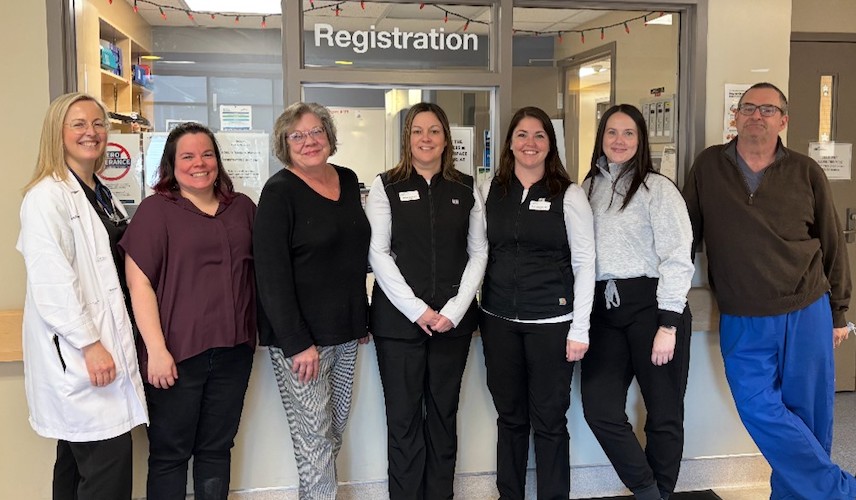Cancer clinic at ICMH bringing care ‘closer to home’
June 3, 2025

Left to right: Dr. Annalee Coakley; Meghan Rankin, Registration & Booking Clerk; Kathy Hannigan, Ward Clerk; Melissa Beaton, RN; Kelly Glabais-Cummings, RN; Laura MacArthur, RN; and Dr. Mark Bennett. Missing from photo is Dr. Kate MacInnes, hematologist.
Investment in the Cancer Care Clinic at Inverness Consolidated Memorial Hospital (ICMH) is allowing cancer patients to receive treatment closer to home.
Valerie Nugent, the Cancer Care Program’s director of operations for the eastern zone, says there’s been a gradual shift away from having to travel to Cape Breton Regional Hospital in Sydney for cancer treatments.
“Government investment in these community clinics has been tremendous over the past couple of years, and that enabled us to move care closer to home,” Nugent says.
“We’re shifting out of the main cancer centres and allowing patients to receive their treatment in their own community hospitals, surrounded by family, friends, and a familiar space,” she adds. “If you speak with any of the patients, they will tell you it’s the place to be, and it aids in their healing.”
Nugent says in the past year they’ve been able to hire two physicians who help the medical oncologist serve cancer patients at ICMH.
“They are general practitioners in oncology, so they are physicians, but they take special training in oncology, and they help our medical oncologists who were really stressed in seeing a large volume of patients in the main cancer centre,” she explains.
One of those doctors is Dr. Annalee Coakley, who arrived in Inverness in 2024. The other is Dr. Mark Bennett, who has been a physician at the hospital for several years.
“Ninety-two per cent of the patients are receiving their treatment in Inverness,” Nugent says. “The remaining patients are probably receiving combined therapies, where they would need to come to Sydney for their radiotherapy piece of it. But in Inverness they receive their systemic therapy, which is their chemotherapy and their immunotherapy, and sometimes they get injections.”
She says within the past 12 months, there were 874 visits to the Inverness oncology clinic, which represents a total of 106 patients.”
“So the visits are high,” she adds, noting that Dr. Kate MacInnes, a hematologist, is on-site at ICMH two days a week.
“We also have one of our medical oncologists (Dr. Wissam Saliba) going down (to ICMH) once a month, so patients don’t have to travel,” she says.
“He oversees treatment, if there’s a new patient visit,” she adds. “The GPOs (the general practitioners in oncology), they can’t see new patients, but they can see follow-up visits. So that frees up the medical oncologist to see any new patients.”
Nugent says the local clinic also provides virtual care, which limits the amount of travel patients must endure in order to get treatment.
“If a patient requires a consult with a radiation oncologist (in Sydney), we can do a virtual consult,” she says. “So, it saves patients a trip, and if there’s any follow-up they can do it virtually.”
A third oncology nurse has also recently been hired in Inverness. Along with administering treatments,
their expertise is crucial, Nugent says, in providing the virtual care part of the program.
A further investment has also been made in pharmacy at the hospital, she notes.
“We’ve invested in pharmacy in Inverness so that our pharmacy technicians and our pharmacists can mix the treatments on site, so they don’t have to bring them in.”
“Those pharmacists are employed at the local hospital and a percentage of their time is dedicated to oncology. So, you have the pharmacy technicians mixing the drug, pharmacists checking the drug, nurses administering the drug, and physicians overseeing the entire process.”
Although the Inverness clinic has grown in recent years, Nugent says they’re at the stage where they’re considering what other improvements can be made.
“We’re growing and we’re getting to the point where we do need to look at how do we expand and where do we expand. That requires a lot of consultation and time, and we’re just in the early stages of that.